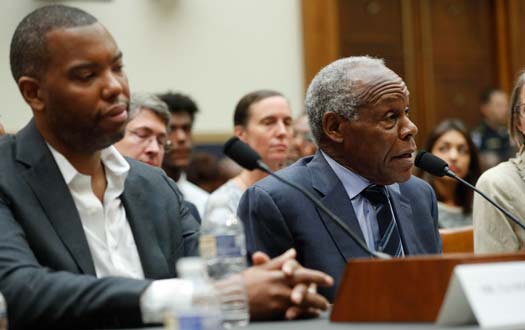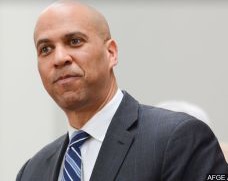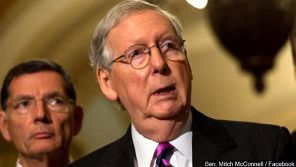Congressional hearing on reparations attracts thousands as lawmakers hear about the legacy, tragedy of slavery
By Askia Muhammad -Senior Editor- | Last updated: Jun 27, 2019 - 9:31:39 AMWhat's your opinion on this article?

Actor Danny Glover, right, and author Ta-Nehisi Coates, left, testify about reparations for the descendants of slaves during a hearing before the House Judiciary Subcommittee on the Constitution, Civil Rights and Civil Liberties, at the Capitol in Washington, June 19.
|
WASHINGTON—The first congressional hearing about reparations for slavery could not have been more dramatic. Thousands of mostly Black people literally circled the Rayburn House Office Building in a line waiting to get into the standing room only hearing room. Inside hangs a portrait of John Conyers (D-Mich.), former Judiciary Committee Chair, and original author of H.R. 40, the bill under consideration, to create a commission to study the effects of slavery and make recommendations to Congress. Recommendations could include a formal apology for slavery and even “reparative justice” payments to descendants of slaves.
The hearing of the House Judiciary Subcommittee on the Constitution, Civil Rights and Civil Liberties was organized by Rep. Sheila Jackson- Lee (D-Texas) who inherited sponsorship of H.R. 40 when Mr. Conyers abruptly retired from the House. It was subtitled “the Path to Restorative Justice,” and was held on June 19, 2019, “Juneteenth,” the day which commemorates June 19, 1865, the last day of slavery in the United States.
But the very idea of reparations was sneered at by Senate Majority Leader Mitch McConnell (R-Ky.) before the hearing convened. Mr. Mc-Connell told reporters that the country had already addressed its historic racial injustices—what he called its “original sin”—in part through the election of President Barack Obama. He said he opposes reparations in part because “none of us currently living are responsible” for slavery.
“There’s a tremendous amount of ignorance in that statement,” said Sen. Cory Booker (D-N.J.). “The stain of slavery was not just inked in bloodshed, but in the overt, state-sponsored policies, fueled by White supremacy and racism, that have disadvantaged African- Americans economically for generations,” Sen. Booker testified.

Cory Booker
|
“Many of our bedrock domestic policies that have ushered millions of Americans into the middle class, stimulating generational wealth and opportunity, like the GI bill, and Social Security, were intentionally designed to exclude Blacks. From school segregation to red-lined neighborhoods to discriminatory mortgage lending,” he said.
Writer Ta-Nehisi Coates, whose 2014 article in The Atlantic helped spark the current debate, also responded to the Senate Republican leader, detailing a “relentless campaign of terror—a campaign that extended well into the lifetime of Majority Leader McConnell.
“We grant that Mr. McConnell was not alive for Appomattox, but he was alive for the electrocution of George Stinney. He was alive for the blinding of Isaac Woodward. He was alive to witness kleptocracy in his native Alabama.

Mitch McConnell
|
Republican subcommittee members were largely absent for the four-hour session—only four of 12 GOP reps bothered to appear in the hearing room at any time. All the Democrats attended, including several not on the c o m m i t t e e who attended briefly to show solidarity. The Republican, anti-reparations viewpoint was represented by former NFL player and Fox News contributor Burgess Owens, who suggested that if anyone was responsible for paying reparations, it was the Democratic Party.
Mr. Owens opposes reparations, but his testimony points to some historical contradictions with today’s Democratic Party that he believes makes them as responsible as anyone for paying for the sins of America’s past.
But a White woman from a prominent New England family made a startling confession about her family’s involvement in the slave trade. “What my grandmother didn’t know, but I soon found out, was that the DeWolfs, over three generations, brought more enslaved Africans to the Americas than any other U.S. family, from the North or the South,” Katrina Colston Browne, producer of film “Traces of the Trade: A Story from the Deep North,” testified.
“Over 12,000 men, women, and children were taken across the Middle Passage on their ships. The family’s leading slave trader, James DeWolf, was reported to have become the second-richest man in the nation by the time of his death—and he had served as a member of the U.S. Senate.
“One of the first things I learned was that the DeWolfs were not alone: Rhode Island was the state that dominated the slave trade. Not South Carolina, not Virginia. And this was just the tip of the iceberg.
“Contrary to what I, and so many of us, learned in history classes growing up, slavery was legal in northern states for over 200 years; a considerable percentage of northerners made their livings in businesses tied to the slave trade and slavery; and even as slavery and the slave trade were being abolished in the North, the Industrial Revolution took hold in northern mills processing raw cotton harvested by enslaved people in the South; banks and insurance companies made fortunes financing southern cotton production; and so on and so on.”
“I think that lots of people did not know about the history of economic terrorism that happened to Black people, the post reconstruction era,” Dr. Julianne Malveaux, a prominent economist and president emeritus of Bennett College for Women told The Final Call after her testimony. “When I wrote the piece for the ACLU, the young man who was my editor actually wondered: ‘Did this really happen? Did this really happen?’ Well, yes, it really happened. And so I think a lot of people learned about that.”
The conveners of the hearing were satisfied with the outcome. “This bill was in the Constitutional Subcommittee because we were finalized as second class, secondary, non-existent persons by the Constitution of the United States,” Rep. Jackson Lee told The Final Call.
“We were property pursuant to the Constitution. We were non citizens pursuant to the Constitution and we had to be dignified pursuant to the Constitution when they totally removed slavery in the United States by the 13th Amendment and the 14th Amendment of due process and equal opportunity under the law.
“We, Black people are products of the Constitution that then spread out to the rest of the public. Well, let’s hope that people will look at it over and over. I hope that people will see that although (the hearing) was passionate, (there) was dignity, there was respect, but I really think the real issue will be, can we move this legislatively and to the floor of the house? I hope we’ll do (that),” she continued.
Subcommittee Chair Steven Cohen was confident concerning the likely legislative outcome. “I wish the other Republicans would have been here and that was an unfortunate thing,” he told The Final Call. “But I think the Democrats are all on board and we got the votes and it will be passing the House.”
INSIDE STORIES AND REVIEWS
-
-
About Harriett ... and the Negro Hollywood Road Show
By Rabiah Muhammad, Guest Columnist » Full Story -
Skepticism greets Jay-Z, NFL talk of inspiring change
By Bryan 18X Crawford and Richard B. Muhammad The Final Call Newspaper @TheFinalCall » Full Story -
The painful problem of Black girls and suicide
By Charlene Muhammad -National Correspondent- » Full Story -
Exploitation of Innocence - Report: Perceptions, policies hurting Black girls
By Charlene Muhammad -National Correspondent- » Full Story -
Big Ballin: Big ideas fuel a father’s Big Baller Brand and brash business sense
By Bryan Crawford -Contributing Writer- » Full Story






 Click Here Stay Connected!
Click Here Stay Connected!








